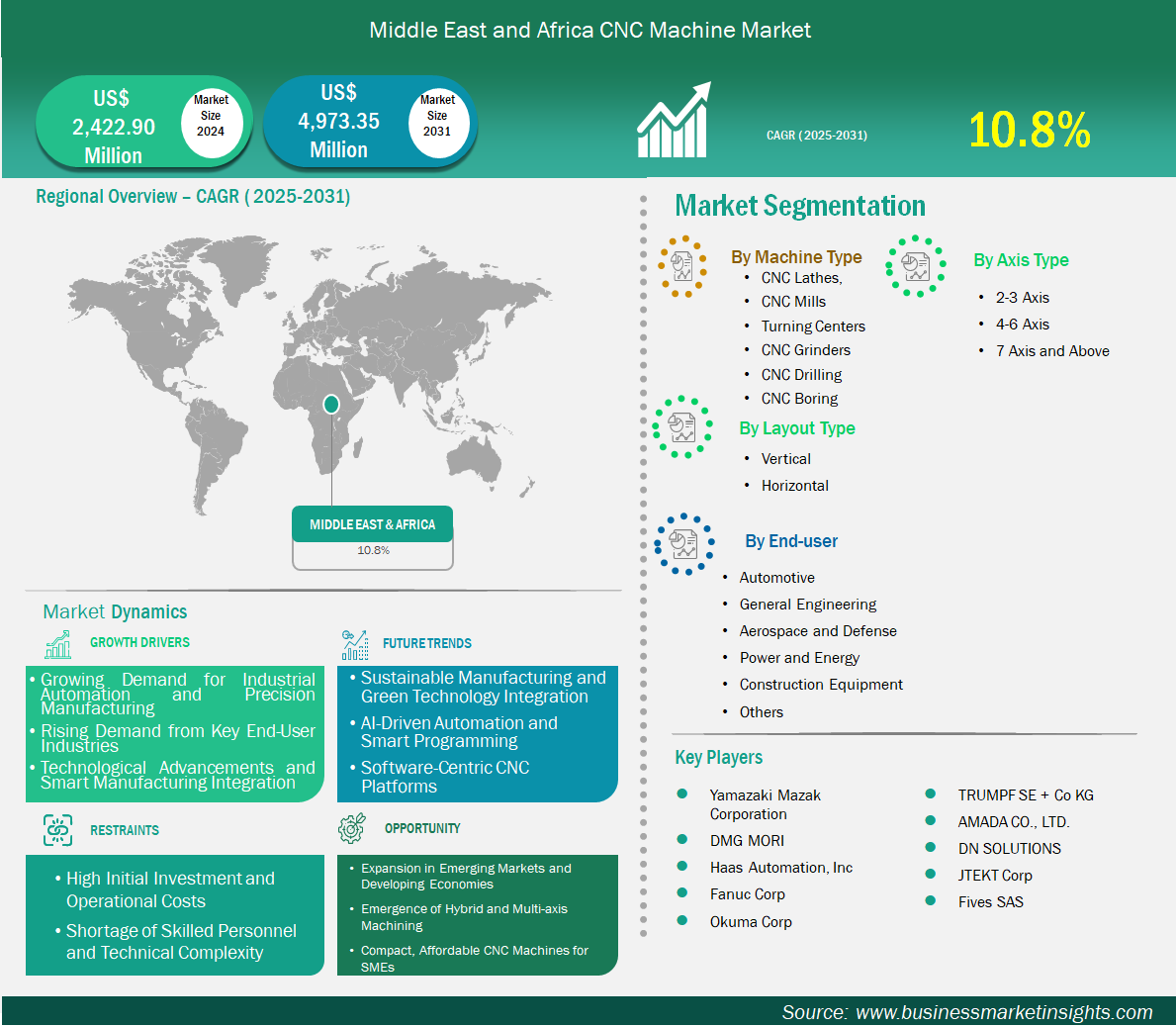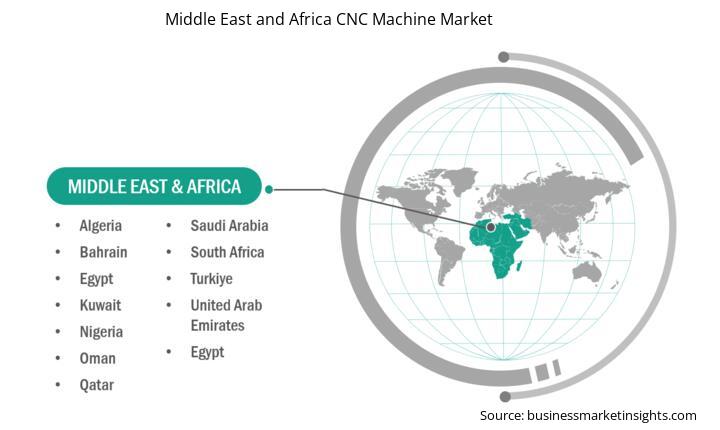The Middle East & Africa CNC machine market size is expected to reach US$ 4,973.3 million by 2031 from US$ 2,422.9 million in 2024. The market is estimated to record a CAGR of 10.8% from 2025 to 2031.
The Middle East & Africa (MEA) CNC machine market presents a growing and increasingly strategic landscape shaped by ongoing industrial diversification, rising infrastructure investments, and a push toward economic modernization. While traditionally not a dominant market in the global CNC landscape, the MEA region is gaining momentum due to government-led manufacturing policies, an expanding industrial base, and increased foreign direct investment. Key countries such as the United Arab Emirates (UAE), Saudi Arabia, South Africa, Egypt, and Nigeria are spearheading this growth, leveraging national industrialization agendas, resource-driven economies, and strategic geographic positioning to attract global investments and scale up precision manufacturing capabilities.
Saudi Arabia leads the CNC machine market in the region, driven by its Vision 2030 initiative, which prioritizes the development of non-oil sectors such as manufacturing, defense, automotive, and aerospace. As the kingdom invests heavily in localizing production capabilities and creating smart industrial zones, demand for CNC machines has surged—particularly in support of precision component manufacturing for defense systems, metal fabrication, and infrastructure projects. The creation of economic cities, free zones, and technology hubs is further accelerating the adoption of advanced manufacturing technologies, including multiaxis CNC machines, automation, and digital control systems. The United Arab Emirates also plays a significant role in the regional CNC landscape. The country’s focus on high-tech industries, coupled with its well-developed logistics and port infrastructure, makes it a key hub for manufacturing and re-export. The UAE’s investment in aerospace, 3D printing, and smart factory initiatives is creating demand for high-precision CNC machinery, particularly in sectors such as aviation parts, medical devices, and automotive customization. Free zones like Jebel Ali and Abu Dhabi’s KIZAD are supporting the integration of CNC technologies into regional supply chains by attracting global CNC equipment suppliers and industrial automation firms. South Africa stands as the most industrialized nation in Sub-Saharan Africa and represents the continent’s largest market for CNC machines. The country benefits from a relatively mature manufacturing ecosystem with capabilities in metalworking, automotive, mining equipment, and industrial tools. Government initiatives promoting industrial revitalization, job creation, and skills development are driving the adoption of CNC technology, especially among local SMEs seeking to modernize operations and compete on global quality standards. Elsewhere in Africa, Egypt and Nigeria are emerging as key CNC markets due to their growing population, rapid urbanization, and increasing infrastructure needs. In Egypt, the development of new industrial cities and government-led megaprojects is fueling demand for metal-cutting and metal-forming CNC equipment. Nigeria, with its large domestic market and ambitions to become a regional manufacturing hub, is seeing increased investment in CNC capabilities to support its automotive, construction, and consumer goods sectors.
The integration of Industry 4.0 technologies is gradually gaining ground in the MEA CNC machine market. Although adoption is at an earlier stage compared to regions like Europe or Asia, manufacturers are increasingly exploring solutions such as AI-powered CNC systems, real-time performance monitoring, predictive diagnostics, and IoT-enabled analytics. These innovations are helping regional manufacturers reduce maintenance costs, enhance part quality, and improve machine utilization. Furthermore, the increasing availability of financing options, government support for technology transfer, and international partnerships are helping lower the barriers to entry for CNC technology across the region.

Key segments that contributed to the derivation of the CNC machine market analysis are machine type, layout type, end-user, and axis type.
The Middle East & Africa (MEA) CNC machine market is steadily emerging as a strategic growth frontier, supported by ongoing industrial diversification, government-led manufacturing initiatives, and a growing focus on automation and digital transformation. Although the region has historically lagged behind more mature CNC markets in terms of technology adoption, recent years have seen a marked acceleration in infrastructure development, foreign direct investment, and industrial modernization—particularly in the Gulf Cooperation Council (GCC) countries and key African economies.
The region's manufacturing sectors—including aerospace, defense, automotive, construction, and energy—are increasingly turning to CNC technologies to improve machining precision, reduce waste, and enable the production of complex parts. Governments across the MEA region are investing in the creation of smart industrial zones, free economic zones, and strategic trade corridors to attract technology suppliers and manufacturing firms. In parallel, the rising need for localized production, combined with growing technical education initiatives and workforce development, is fostering the broader integration of CNC machinery into regional production systems. Moreover, while adoption of Industry 4.0 technologies is still in its early stages, interest in AI-driven diagnostics, IoT-enabled monitoring, and automated CNC systems is rising as manufacturers seek to improve productivity and operational resilience.
Based on country, the Middle East & Africa CNC machine market is segmented into Bahrain, Kuwait, Oman, Qatar, Saudi Arabia, the United Arab Emirates, Turkiye, South Africa, Egypt, Algeria, Nigeria, and the Rest of Middle East & Africa. These countries are leading regional growth due to their expanding manufacturing infrastructure, national industrial strategies, and increasing demand for precision-engineered components.
Saudi Arabia is the most prominent CNC market in the region, supported by its ambitious Vision 2030 program. The country is making significant investments in diversifying its economy beyond oil, with focused efforts on growing domestic manufacturing capacity across sectors such as defense, automotive, construction equipment, and energy. The establishment of industrial cities and smart zones is accelerating demand for CNC machines that support local production of metal parts, precision tools, and defense-related components.
The United Arab Emirates (UAE) also plays a critical role in shaping the regional CNC landscape. With its advanced logistics infrastructure, aerospace investments, and a strong focus on high-tech industries, the UAE is fostering a competitive manufacturing environment. The development of digital manufacturing hubs and the integration of 3D printing and multi-axis CNC systems are helping the country expand its capabilities in aerospace components, customized automotive parts, and industrial machinery.
South Africa leads Sub-Saharan Africa in CNC machine adoption, driven by its relatively developed industrial base. The country’s metalworking, mining, and automotive sectors are key users of CNC systems, particularly for milling, turning, and grinding operations. Government initiatives aimed at industrial revitalization, skills development, and SME support are encouraging further CNC deployment among local manufacturers aiming to enhance productivity and export competitiveness.
Egypt is witnessing growing demand for CNC equipment amid the rapid development of industrial parks, economic zones, and large-scale infrastructure projects. The country is investing in domestic manufacturing of construction components, energy systems, and metal parts, with CNC systems playing a vital role in improving part accuracy and volume output.
Nigeria, as Africa’s most populous country and one of its largest economies, is increasingly focusing on industrialization to reduce import dependency and create jobs. CNC adoption is on the rise in sectors such as construction equipment, power generation, and consumer goods. Government-backed investment initiatives, growing interest in local production, and the emergence of technical training programs are supporting the country’s ambition to become a regional manufacturing hub.
The CNC machine market in MEA is gaining traction across both developed and emerging economies in the region. While adoption challenges such as high capital costs and limited technical expertise remain, the growing need for manufacturing localization, enhanced productivity, and precision engineering is driving sustained investment in CNC technologies. As digital transformation continues to expand and more countries implement smart manufacturing policies, MEA is expected to evolve into a competitive player in the global CNC machinery landscape.
| Report Attribute | Details |
|---|---|
| Market size in 2024 | US$ 2,422.9 Million |
| Market Size by 2031 | US$ 4,973.3 Million |
| CAGR (2025 - 2031) | 10.8% |
| Historical Data | 2021-2023 |
| Forecast period | 2025-2031 |
| Segments Covered |
By Machine Type
|
| Regions and Countries Covered |
Middle East and Africa
|
| Market leaders and key company profiles |
|
Yamazaki Mazak Corporation, DMG MORI, Haas Automation, Inc , Fanuc Corp, Okuma Corp, TRUMPF SE + Co KG, AMADA CO., LTD., DN SOLUTIONS, JTEKT Corp, and Fives SAS are among the key players operating in the market. These players adopt strategies such as expansion, product innovation, and mergers and acquisitions to stay competitive in the market and offer innovative products to their consumers.
The following methodology has been followed for the collection and analysis of data presented in this report:
The research process begins with comprehensive secondary research, utilizing both internal and external sources to gather qualitative and quantitative data for each market. Commonly referenced secondary research sources include, but are not limited to:
Note: All financial data included in the Company Profiles section has been standardized to US$. For companies reporting in other currencies, figures have been converted to US$ using the relevant exchange rates for the corresponding year.
Business Market Insights conducts a significant number of primary interviews each year with industry stakeholders and experts to validate and analyze the data and gain valuable insights. These research interviews are designed to:
Primary research is conducted via email interactions and telephone interviews with industry experts across various markets, categories, segments, and sub-segments in different regions. Participants typically include:

The Middle East and Africa CNC Machine Market is valued at US$ 2,422.9 Million in 2024, it is projected to reach US$ 4,973.3 Million by 2031.
As per our report Middle East and Africa CNC Machine Market, the market size is valued at US$ 2,422.9 Million in 2024, projecting it to reach US$ 4,973.3 Million by 2031. This translates to a CAGR of approximately 10.8% during the forecast period.
The Middle East and Africa CNC Machine Market report typically cover these key segments-
The historic period, base year, and forecast period can vary slightly depending on the specific market research report. However, for the Middle East and Africa CNC Machine Market report:
The Middle East and Africa CNC Machine Market is populated by several key players, each contributing to its growth and innovation. Some of the major players include:
The Middle East and Africa CNC Machine Market report is valuable for diverse stakeholders, including:
Essentially, anyone involved in or considering involvement in the Middle East and Africa CNC Machine Market value chain can benefit from the information contained in a comprehensive market report.
Please tell us your area of interest
(Market Segments/ Regions and Countries/ Companies)